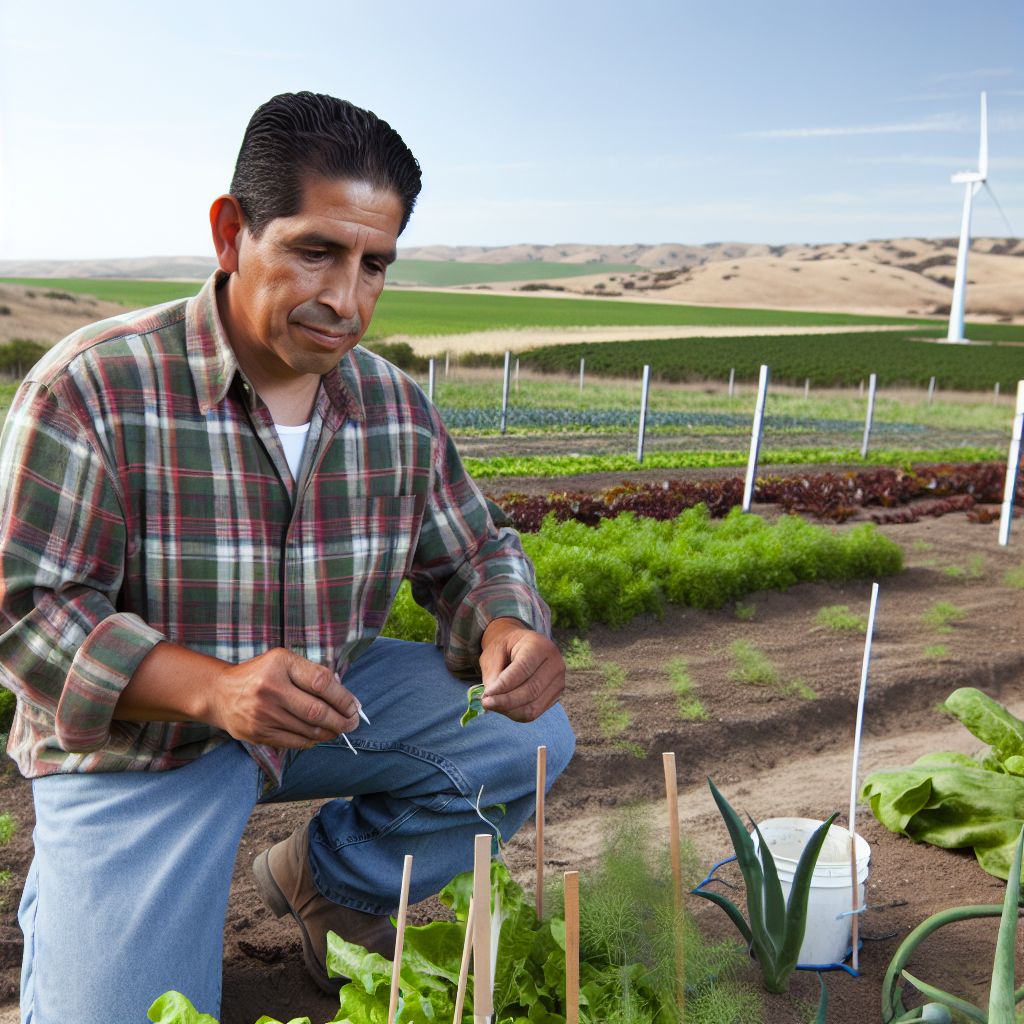Introduction to Sustainable Farming and Its Importance
Definition of Sustainable Farming
Sustainable farming refers to agricultural practices that maintain ecological balance.
It integrates environmental health, economic profitability, and social equity.
This approach minimizes negative impacts while enhancing biodiversity.
Significance of Sustainable Farming
Sustainable farming addresses pressing global challenges such as climate change.
It helps to reduce the carbon footprint associated with conventional agriculture.
Moreover, it promotes soil health and conserves water resources efficiently.
Enhancing Food Security
Sustainable farming practices significantly contribute to food security.
They ensure a consistent food supply for growing populations.
Additionally, sustainable methods support diverse and resilient food systems.
Economic Benefits
Investing in sustainable farming often leads to long-term economic gains.
It reduces dependency on finite resources, lowering production costs.
Furthermore, sustainable farms tend to attract premium pricing due to quality.
Community and Social Engagement
Sustainable farming fosters community development and social equity.
It encourages collaboration among local farmers and consumers.
This approach strengthens local economies while promoting food sovereignty.
Transform Your Agribusiness
Unlock your farm's potential with expert advice tailored to your needs. Get actionable steps that drive real results.
Get StartedDefinition and Types of Collaborations in Agriculture
Collaborations in agriculture play a crucial role in enhancing productivity.
They involve partnerships among farmers, researchers, and organizations.
These partnerships foster knowledge exchange and resource sharing.
Characteristics of Agricultural Collaborations
Collaboration often focuses on common goals and mutual benefits.
Moreover, they can enhance efficiency and leverage specialized skills.
Additionally, they help drive innovations in farming practices.
Types of Collaborations
There are various types of collaborations in agriculture.
They include formal partnerships, informal networks, and cooperative societies.
Formal Partnerships
Formal partnerships involve legally binding agreements among parties.
These arrangements often include shared investments and resources.
In addition, they facilitate joint ventures for large-scale projects.
Informal Networks
Informal networks consist of ad hoc relationships among individuals.
These connections can provide support and knowledge without legal constraints.
Farmers benefit from sharing experiences and best practices.
Cooperative Societies
Cooperative societies are organized groups of farmers or producers.
They enable members to pool resources and collectively market products.
This structure enhances bargaining power and reduces costs.
Benefits of Collaboration
Collaboration offers multiple advantages for sustainable farming.
It can lead to increased productivity and resource efficiency.
Furthermore, it encourages sustainable practices that benefit the environment.
Collaborative efforts can facilitate access to new technologies.
Such partnerships also create a support network for farmers.
Case Studies of Successful Collaborations in Sustainable Farming
Farmers United: A Cooperative Success
Farmers United is a cooperative formed by local farmers in Vermont.
This collaborative effort focuses on sustainable practices and shared resources.
Showcase Your Farming Business
Publish your professional farming services profile on our blog for a one-time fee of $200 and reach a dedicated audience of farmers and agribusiness owners.
Publish Your ProfileMembers share equipment to reduce costs and increase efficiency.
Moreover, they exchange knowledge on crop rotation and pest management.
This collaboration has increased their overall productivity by 30%.
Urban Gardens Initiative
The Urban Gardens Initiative is a partnership between city dwellers and local farms.
This initiative promotes community gardens in urban neighborhoods.
It encourages residents to grow their own food sustainably.
Participants receive training on organic farming techniques.
As a result, urban produce yields have risen dramatically.
The Agritech Alliance
The Agritech Alliance brings together tech companies and farmers.
This collaboration focuses on innovative farming technologies.
Through shared research, they develop sustainable irrigation systems.
These systems conserve water and enhance crop production.
This partnership has led to a 45% increase in crop yields for participating farms.
Sustainable Supply Chains
A group of organic farmers in California formed a supply chain collaboration.
This coalition connects farmers directly with consumers and retailers.
By eliminating middlemen, they ensure fair prices for all parties.
This partnership enhances transparency for consumers.
Consequently, their sales have increased significantly over the past year.
Research and Education Collaborations
Universities and local farmers collaborate for research projects.
This partnership aims to develop sustainable agricultural methods.
Researchers provide farmers with data-driven insights.
Farmers share practical experiences to inform academic studies.
As a result, both parties benefit from shared knowledge and improved practices.
Learn More: Business Continuity Planning for Agribusiness
Benefits of Knowledge Sharing Among Farmers
Enhancing Agricultural Practices
Collaboration among farmers leads to shared knowledge on best practices.
This sharing encourages the adoption of innovative techniques.
Farmers benefit from advice on pest management and crop rotation.
Ultimately, this results in improved yield and quality.
Building Stronger Communities
Knowledge sharing helps build stronger farming communities.
Farmers create networks through collaboration.
These networks offer emotional and technical support.
Furthermore, strong communities promote resource sharing.
Access to Resources and Information
Collaborations provide access to valuable resources.
Farmers gain insights into sustainable practices and technology.
This access helps optimize resource use and reduce waste.
Moreover, shared information reduces research costs for individual farmers.
Increased Resilience to Challenges
Knowledge sharing enhances resilience to agricultural challenges.
Farmers can exchange strategies for coping with climate variability.
Additionally, collaboration fosters adaptation to market changes.
This approach encourages sustainable practices for long-term viability.
Showcase Your Farming Business
Publish your professional farming services profile on our blog for a one-time fee of $200 and reach a dedicated audience of farmers and agribusiness owners.
Publish Your ProfileFind Out More: Using Technology to Boost Your International Farming Business
Role of Technology Partnerships in Enhancing Productivity
Introduction to Technology Partnerships
Technology partnerships form essential alliances in sustainable farming.
They integrate innovative practices and tools that boost efficiency.
These collaborations often involve agricultural startups and established tech firms.
Benefits of Collaborations
Collaborations enhance knowledge sharing among stakeholders.
Farmers gain access to cutting-edge technologies through these partnerships.
Additionally, partnerships facilitate research and development opportunities.
This results in higher yields and improved crop resilience.
Access to Advanced Tools
Farmers can utilize drones for precise field monitoring.
They can also implement sensors that provide real-time data.
These tools help optimize resources like water and fertilizers.
Improving Sustainable Practices
Collaborations promote sustainable practices through shared knowledge.
Farmers learn to minimize chemical use while enhancing productivity.
This leads to healthier ecosystems and increased biodiversity.
Real-World Examples
One successful partnership is between FreshTech and GreenHarvest.
This collaboration introduced AI-driven soil analysis for farmers.
As a result, farmers experienced a 30% increase in crop yields.
Challenges in Collaborations
Building effective partnerships can be challenging.
Issues may arise from differing goals and communication barriers.
However, addressing these challenges leads to significant innovations.
The Future of Technology Partnerships
As agriculture continues to evolve, technology partnerships will remain critical.
They will help address global food security challenges effectively.
Moreover, these collaborations will foster sustainable practices worldwide.
Learn More: Developing a Marketing Plan for Your Agribusiness
Impact of Community-Supported Agriculture on Local Farms
Strengthening Local Economies
Community-supported agriculture (CSA) programs significantly boost local economies.
These programs connect consumers directly with farmers.
Consequently, farmers gain stable income through advance purchase agreements.
In turn, consumers receive fresh and locally sourced produce.
This mutual support fosters a sense of community.
Enhancing Farmer Sustainability
CSA programs enhance sustainability for many local farmers.
They allow farmers to diversify crops based on community preferences.
Additionally, farmers can reduce reliance on large distributors.
As a result, they enjoy more control over their farming practices.
Building Stronger Relationships
CSAs create strong relationships between farmers and community members.
Regular communication builds trust and loyalty among participants.
This personal connection ensures consistent support for local agriculture.
Promoting Healthier Food Choices
From a nutritional standpoint, CSAs promote healthier food choices.
Members receive fresh, seasonal produce that is free from pesticides.
This encourages consumers to explore various fruits and vegetables.
Moreover, increased awareness fosters healthier eating habits within communities.
Showcase Your Farming Business
Publish your professional farming services profile on our blog for a one-time fee of $200 and reach a dedicated audience of farmers and agribusiness owners.
Publish Your ProfileContributing to Environmental Sustainability
CSAs support environmentally sustainable farming practices.
These practices often include organic farming and reduced chemical usage.
Consequently, participating farms can improve soil health and biodiversity.
This commitment to sustainability benefits the entire ecosystem.
Explore Further: Content Marketing Ideas for Agribusiness Brands

Strategies for Fostering Effective Collaborations in Farming
Building Trust Among Farmers
Establishing trust is vital in any collaboration.
Farmers should engage in open and honest communication.
Moreover, sharing challenges can foster deeper connections.
Organizing regular meet-ups encourages relationship-building.
Additionally, transparency in decision-making enhances trust.
Utilizing Technology for Communication
Technology plays a crucial role in modern collaborations.
Farmers can utilize platforms like WhatsApp for instant communication.
Shared online calendars can help manage schedules efficiently.
Moreover, project management tools streamline collaboration efforts.
As a result, technology reduces misunderstandings and enhances productivity.
Creating Joint Ventures
Joint ventures can significantly boost farm productivity.
Collaborating on shared resources maximizes efficiency.
For example, farmers can co-invest in equipment.
Additionally, pooling knowledge can lead to innovative practices.
These partnerships create a sense of shared responsibility.
Participating in Cooperative Programs
Cooperatives offer a structured approach to collaboration.
Farmers can benefit from collective bargaining power.
This approach often leads to better prices for inputs and sales.
Moreover, cooperatives can facilitate shared marketing efforts.
Engaging with cooperatives provides valuable learning opportunities.
Implementing Sustainable Practices Together
Collaborating on sustainability can enhance farm productivity.
Farmers can share resources for organic farming practices.
This collectively reduces costs and improves soil health.
Moreover, sharing data on pest management can be beneficial.
Jointly implementing best practices amplifies environmental impacts.
Networking with External Stakeholders
Engaging with external entities enhances collaborative efforts.
Farmers can partner with local universities for research initiatives.
Additionally, connecting with NGOs can provide funding opportunities.
Networking also opens doors for access to new markets.
Collaboration with diverse stakeholders enriches farming initiatives.
Challenges and Barriers to Successful Farm Collaborations
Communication Breakdowns
Effective communication remains critical in any collaboration.
Many farmers face challenges when discussing goals and expectations.
Misunderstandings often lead to conflicts on shared objectives.
To resolve this, regular meetings can help keep everyone aligned.
Differing Practices and Policies
Each farm may have unique practices that influence collaboration.
Showcase Your Farming Business
Publish your professional farming services profile on our blog for a one-time fee of $200 and reach a dedicated audience of farmers and agribusiness owners.
Publish Your ProfileFarmers might prioritize different types of crops or farming techniques.
Understanding these differences is essential for effective teamwork.
Creating a unified strategy can address these discrepancies.
Resource Allocation Conflicts
Disagreements over resource distribution often hinder collaborations.
Farmers need to agree on how to allocate equipment and labor.
This can create tension, especially in shared projects.
Transparent discussions about resource management can alleviate stress.
Legal and Regulatory Challenges
Farm collaborations must navigate complex legal landscapes.
Different regions may have varying regulations affecting practices.
Farmers must ensure compliance to avoid penalties.
Seeking legal advice can simplify this process significantly.
Cultural and Personal Differences
Collaboration might face hurdles due to personal biases.
Cultural differences can influence communication styles and expectations.
Farmers should foster an atmosphere of respect and inclusion.
Team-building activities can bridge gaps among collaborators.
Lack of Shared Vision
A strong shared vision enhances collaboration success.
When goals diverge, progress can stall abruptly.
Establishing a common purpose from the outset is vital.
Creating a strategic plan can unify farmers under one goal.
Future Trends in Collaborations for Sustainable Agricultural Practices
Increased Interdisciplinary Partnerships
Farmers will increasingly collaborate with researchers and scientists.
This partnership will enhance innovation in crop management techniques.
Additionally, knowledge sharing will improve sustainable practices.
Universities and agricultural institutes will play vital roles.
Technological Integration
Collaborations will focus on integrating advanced technologies.
These include precision agriculture and data analytics tools.
Farmers will benefit from tailored solutions for their specific needs.
Moreover, technology can facilitate real-time monitoring of crops.
Community Engagement and Co-ops
Community-based collaborations will gain momentum in the coming years.
Local farmers will form cooperatives to pool resources.
These groups can share knowledge and market products efficiently.
Furthermore, collaborations will foster a sense of community and trust.
Sustainable Supply Chains
More emphasis will be placed on sustainable supply chain collaborations.
Producers will partner with retailers focused on sustainability.
This partnership promotes transparency and traceability in sourcing.
Consequently, consumers will have a better understanding of their food sources.
Government and NGO Partnerships
Government programs will increasingly support collaborative efforts.
NGOs will assist in funding and developing sustainable projects.
These partnerships will provide vital resources and training for farmers.
Moreover, they will advocate for policies promoting sustainability.
Additional Resources
Application of digital technologies for ensuring agricultural productivity
Showcase Your Farming Business
Publish your professional farming services profile on our blog for a one-time fee of $200 and reach a dedicated audience of farmers and agribusiness owners.
Publish Your ProfileConservation Innovation Grants Awards Fiscal Year 2023 | Natural …




